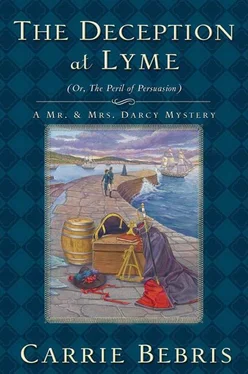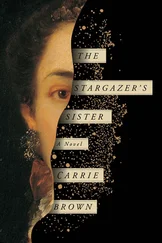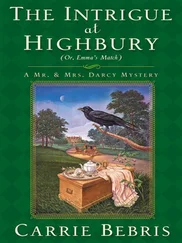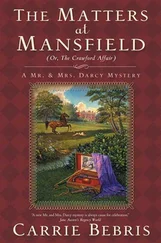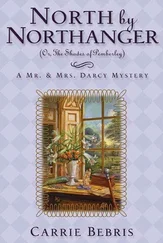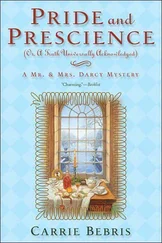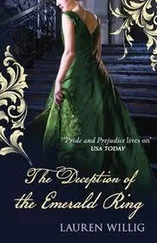“Mr. Elliot?” Elizabeth glanced to Mrs. Wentworth. “I hope he has not harassed you about Alfred since the child came to live with you?”
“He has not called. I believe he spoke his piece to Captain Wentworth at Alfred’s christening.”
“Well, you can wager Alfred is still in his thoughts,” Mrs. Smith said. “He will not forget a child who cost him his baronetcy. Self-interest is too great a portion of his character. So, too, is a propensity for plotting and scheming.”
This declaration, issued with vehemence, unsettled Mrs. Wentworth enough that she excused herself to go upstairs and ascertain Alfred’s present well-being. Left alone with Mrs. Smith, Elizabeth was happy for the opportunity to speak privately with the widow. Though this visit to the Wentworths had been motivated by the Darcys’ genuine interest in improving their acquaintance with the captain and his wife, and in seeing how Alfred fared, Elizabeth also hoped to learn more about the circumstances of Mrs. Elliot’s death.
“Was Mr. Elliot always this way?” Elizabeth asked. “Surely, in the days when he was your friend—”
“I do not believe he was ever my friend, nor my husband’s. Not in the true sense of friendship. I do not believe him capable of unselfish feeling for any creature.”
“Not even for his wife—before her affair with Mr. Clay?”
“Especially not his wife. It was his heartlessness and neglect that caused the tryst in the first place. I think the months that Mr. Elliot was in the West Indies with my husband were the one period of her marriage when Mrs. Elliot was truly happy. Or at least, not miserable.”
“The Elliots’ marriage was not a match of affection?”
“It began as one on her side, but for Mr. Elliot it was never anything but a financial transaction. She was of common birth—the granddaughter of a butcher and the daughter of a grazier—but her father was successful enough to provide a decent education and dower her with a considerable fortune. Mr. Elliot wanted money, and she had it, so he wed her despite her lack of bloodline or connexions. At first he was content with the choice he had made—as I said when we spoke previously, we were all living in the moment, and at the moment her money and what it could buy made him happy—but as he became more conscious of his future as a baronet, he grew to despise his wife. Not only did he resent her pedigree and lack of connexions, but also the fact that their marriage had produced no children, and therefore no heir to succeed to the baronetcy after him. He blamed her entirely for their childlessness—men always do—and treated her cruelly.
“I suspected his unkindness toward her, but it was not until both our husbands were overseas that I became her confidante and learned the extent of her mistreatment. She was desperate to have a baby, hopeful that the birth of an heir would appease Mr. Elliot. Mr. Clay having already proved himself able to father a child, Mrs. Elliot deliberately set about seducing him.”
“Did she not consider that a betrayal of her friendship with Mrs. Clay?” The former Penelope Shepherd had fallen so far in Elizabeth’s esteem that, like Anne Wentworth and Mrs. Smith, she found she could no longer—whether in the privacy of her own thoughts or in conversation with anyone but Sir Walter—refer to the baronet’s second wife as “Lady Elliot.” It seemed the only thing ladylike about her had been her title, and that, she had enjoyed less than four-and-twenty hours.
“Mrs. Clay had cuckolded Mr. Clay enough times that it was easy for an abused, despairing woman to justify borrowing a husband whose wife was herself so unfaithful,” Mrs. Smith said. “Indeed, when Mrs. Elliot told me of additional lovers Mrs. Clay had taken, paramours that I had not known about previously, I, too, lost all sympathy for her. Mrs. Elliot employed the period of Mr. Elliot’s absence to engage Mr. Clay’s interest, but delayed consummating the liaison until her husband returned to England, so that the child she hoped to conceive would not be born too soon to pass off as Mr. Elliot’s. Unfortunately, Mr. Clay died in the act, and their affair was exposed.”
“How did Mrs. Clay respond?”
“She was incensed with Mrs. Elliot, but soon saw Mr. Clay’s death as opportunity. Free of her husband, she became the quintessential merry widow and set her sights on Mr. Elliot. Tit for tat, as they say, but as a future baronet he also appealed to her social-climbing ambitions. She pursued him, and he casually took what was offered.”
“Did Mrs. Elliot know?”
“Certainly. After Mr. Clay’s death exposed her infidelity, Mr. Elliot subjected her to even greater cruelty than before. He took no pains to conceal his liaison with Mrs. Clay; in fact, he flaunted it.” Mrs. Smith shook her head sadly. “Poor woman. Mrs. Elliot died a very unhappy creature.”
“How did she die?”
“She fell down a flight of stairs. It happened only last year, and by then I was no longer on intimate terms with the Elliots, so I do not know the particulars. But given Mr. Elliot’s mistreatment of her, I have often wondered whether the event was an accident.”
Despite the summer heat, Elizabeth shivered. “You suspect she was pushed?”
“Either physically or emotionally, for I can easily imagine her reaching a state of despair great enough to have thrown herself down rather than endure her bleak existence any longer. Regardless, her death freed Mr. Elliot to marry someone capable of producing an heir, and he certainly lost no time in pursuing his bride of choice.”
Elizabeth was confused. “Mrs. Clay?”
“No, Mrs. Wentworth—when she was yet Anne Elliot.” Mrs. Smith glanced toward the door through which Mrs. Wentworth had exited, and lowered her voice. “However, shortly before he began courting Anne, Mrs. Clay returned to her father’s home in Kellynch village and became the eldest Miss Elliot’s bosom friend, visiting constantly at the Great House, so ingratiating herself that when the Elliots removed to Bath they invited her to take up residence with them. All the while, Mr. Elliot and Mrs. Clay affected indifference toward each other whenever he called upon the Elliots, never letting on that they knew each other intimately. In retrospect—I have told Anne this, and she agrees—I believe he installed Mrs. Clay in Sir Walter’s household so that she could gather information useful to his suit, or to his financial plans for the estate.”
“How did he do that?”
“By convincing her they would both benefit from his protecting his inheritance. If his courtship of Anne proved successful, neither he nor Mrs. Clay would see any reason why he should give up his mistress simply because he had taken a wife. And if it did not, Mrs. Clay would enjoy a more lavish style of living while possibly catching Mr. Elliot for herself at last. However, I think he underestimated Mrs. Clay’s cunning. If you recall what Anne’s sister Mary said at the christening fete, I believe that once Mrs. Clay infiltrated Sir Walter’s household, she developed ambitions of her own, and set her cap for Sir Walter.”
“Then why did she run off with Mr. Elliot?”
“Not being privy to their thoughts, I can only speculate based on my knowledge of their characters. I think he realized her scheme, and eliminated the threat she posed by persuading her of his own intentions to marry her. Mrs. Clay was vain enough to believe him. The two of them deserved each other—they were a pair of despicable human beings.”
Mrs. Wentworth returned with Alfred in her arms. “He was waking up,” she said, “and given the subject of our conversation, I—well, please do not think me silly, but I felt that I wanted him with us in here.”
“I do not think you silly at all,” Elizabeth said.
Читать дальше
